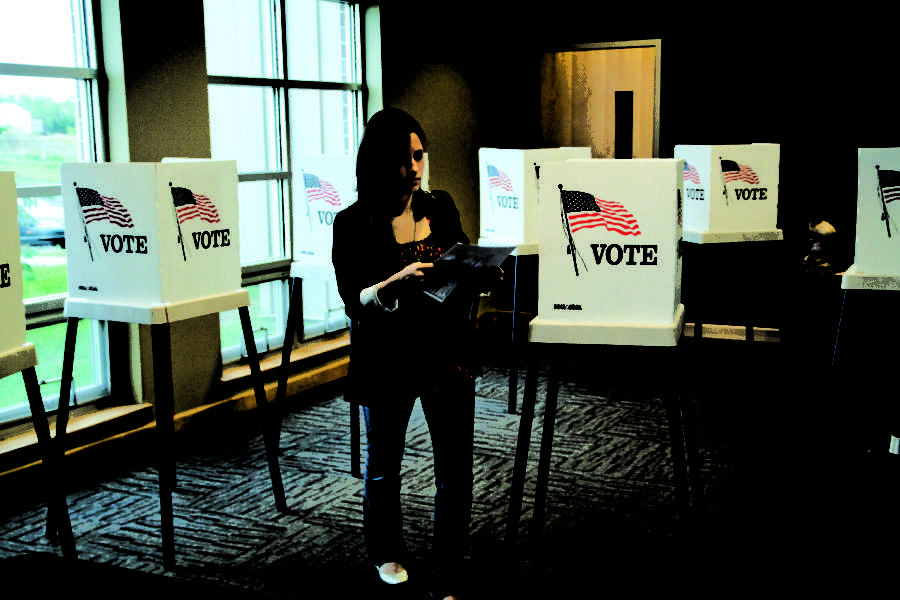Belding: Voting isn’t enough
Bryan Langfeldt/Iowa State Daily
Katlyn Brekke, center, junior in elementary education casts her early mid-term vote Oct. 24 at Cornerstone Church. Mid-term election voting took place Oct. 24 at Cornerstone Church in Ames.
October 31, 2010
The political off-season is about to begin. On Tuesday, Nov. 2, huge masses of the freest people in the world will go to their precincts, fill out their ballots and go home. They will think they have participated. They haven’t. The political off-season — that time between elections – in no way requires their votes or presence.
I urge you to go vote, but only if you have taken the time to explore the candidates and what they think of the issues. Watching TV ads and reading the fliers that come to your mailbox don’t count. If you can’t make heads or tails of politics, ask a politically astute, trustworthy friend who will talk to you about who the candidates are, how they conduct themselves in their offices and what the ballot initiatives mean.
Voting isn’t political. How could it be? When a person goes to fill out a ballot, he does so in a closet-sized space all by himself. At the end of the day, when the votes are tallied, the winners are the party whose voters, in isolation, arrived at the same conclusion. Politics is an activity that is possible only with other people. Voting, which relies on force of numbers alone, isn’t political. And the campaign season isn’t either.
The time between elections is what’s actually important. The two-or-so-year period between election cycles does not involve the ordinary citizen. He cannot march into Washington, D. C. and cast a vote on any measure — not even the most insignificant parking assignment decision.
Between elections is when solutions to problems are brainstormed by people who can actually implement them. Potential solutions are drafted, worked out, discussed and approved or rejected. Politics in the interim between elections focuses not on galvanizing supporters, discouraging the opposition and winning by sheer numbers. Actual politics focuses instead on crafting solutions to issues and controversies.
To actually be involved in politics, citizens must be involved in politics all the time, not just during campaign season. Voting isn’t enough. You cannot simply go vote and expect the world to be changed because of it. Politics requires continuous involvement, not participation for a single moment on a single day.
Have you noticed that it’s the people who appear in front of public buildings throughout the year with their banners and speeches that receive news attention and set trends for the next campaign season? Despite such demonstrations’ composition as masses of people, they are effective vehicles of political participation. That is because the members of that mass are the people who agitate during campaigns. Inevitably, those same people are the ones soliciting donations, making get-out-the-vote calls and walking from house to house distributing literature.
Voting won’t change the world. Yes, it determines who holds office and who enacts law until the next election. But the issues are determined by the people impacted by crisis situations and the publicity they garner. If a problem isn’t exposed to enough attention, it does not become an issue for the public realm to solve through our government, election-decided institutions.
Please vote. But only do it if you have a reason. If you’re voting simply because you’re allowed to, and not because there is a legitimate issue you care about, don’t cast your ballot. In voting anyway, people dilute the political pond and take away power that rightfully belongs to the voters who will agitate for an issue year-round, until the next election.
What is disturbing about this isn’t that people vote for no reason. What is disturbing is that people act for a single moment as if things matter to them, and then they stay home until the next election.
Elections aren’t the only opportunity to try your skill at politics. They exist to reaffirm your participation.







